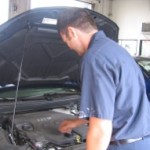Did you know that you should flush your brake fluid regularly? Most of us don’t know when to flush our brake fluid or why we need to do it.
Brake fluid attracts moisture, and when moisture enters the brake fluid system, it creates some hazardous conditions.
- Moisture forms acid that attacks the rubber seals and keeps them from sealing properly.
- Moisture creates rust and corrosion that can become clogged in small passages and causes engine parts to seize.
- Moisture reduces the boiling point of brake fluid. When brake fluid boils it changes from a liquid to a gas, this prevents the brake fluid from doing its job correctly. It can only perform effectively if it remains a liquid. If your brake fluid boils, a vapor is created that reduces the amount of pressure that’s applied to the brake pads. If this happens, you can push the brake pedal all the way to the floor and still not be able to stop your vehicle.
This moisture was not a huge issue ten years ago, but on ABS brake systems of today, the rust and debris that collects in the fluid can cause internal damage and be very costly. For more information on ABS systems check out our blog.
So how do you know when to flush your brake fluid? Have your technician check the three C’s: color, clarity, and content. The color of your brake fluid should be a light amber. The clarity should be clear, which means it shouldn’t have any particles or debris in it. And the moisture content should be less than 3 percent.
According to AAA, many cars on Colorado roads today, were built by European automakers and require regular brake fluid inspections, which about half the cars fail. Such inspections aren’t required here, but someone needs to monitor the color, clarity and moisture content of a vehicles brake fluid, either the owner or better yet, a professional! Brake fluid flushes are recommended every two years by industry standards, sooner if you live in a humid climate. Check with your technician and discuss what works best for you and your vehicle.
For all of your Denver Auto Repair needs, trust Express Car Care. Call (303) 691-2760 or stop by our shop today.

Leave a Reply
You must be logged in to post a comment.